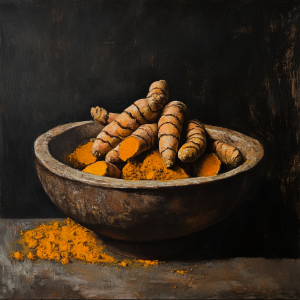
Hydration is most important for diarrhea
Let’s say that disaster strikes, and you find yourself consuming food that you’re not entirely used to. (perhaps because you didn’t live by the “buy what you eat, eat what you buy” rule *grin*) Chances are highly likely that you’re going to end up with a case of the stomach flu. So, let’s look at how the symptoms can be mitigated. Because when diarrhea strikes, it can really put a damper on your day (and your pants). While severe or prolonged cases should always be evaluated by a healthcare professional, if possible, many mild cases can be managed with natural remedies. Here’s a list of nature’s own anti-diarrheal agents that might help you weather the storm.
- Hydration is Key
First things first: replace those lost fluids!
- Water: The classic choice. Sip, don’t guzzle.
- Coconut water: Nature’s sports drink, rich in electrolytes.
- Herbal teas: Chamomile, peppermint, or ginger can be soothing.
- The BRAT Diet
This bland diet can help firm up stools:
- Bananas: Rich in pectin, which helps absorb liquid in the intestines. (Freeze-dried work!)
- Rice: White rice, in particular, can help bind stools.
- Applesauce: Contains pectin and is easy on the stomach.
- Toast: Plain, white toast is easily digestible.
- Probiotics
Restore that gut balance with some beneficial bacteria:
- Yogurt: Look for “live cultures” on the label.
- Kefir: A fermented milk drink packed with probiotics.
- Sauerkraut or kimchi: If you’re feeling adventurous.
- Herbal Remedies
Nature’s medicine cabinet has some potent anti-diarrheal options:

Some herbal teas help with diarrhea
- Chamomile tea: Known for its anti-inflammatory properties.
- Peppermint tea: Can help relax intestinal muscles.
- Ginger: Whether as tea, candied, or in capsules, it can help soothe the gut.
- Psyllium husk: A soluble fiber that can help firm up stools.
- Astringent Foods
These foods can help tighten tissues and dry out your intestines:
- Blueberries: Rich in astringent tannins.
- Blackberries: Another berry high in tannins.
- Green tea: Contains tannins and is hydrating.
- Starchy Foods
These can help absorb excess fluid in the intestines:
- Potatoes: Boiled or mashed, hold the butter.
- Carrots: Cooked until very soft.
- Squash: Well-cooked and easily digestible.
- Apple Cider Vinegar
A folk remedy with some science behind it:
- Mix 1 teaspoon in a glass of water.
- The pectin in ACV may help soothe intestinal spasms.
- Fenugreek Seeds
An ancient remedy still used today:
- Soak 1 teaspoon of seeds in a cup of hot water.
- Drink the water and eat the seeds.
- Turmeric
This golden spice has anti-inflammatory properties:
- Mix 1/2 teaspoon in warm water or milk.
- Add a pinch of black pepper to increase absorption.
- White Oak Bark

Turmeric helps with inflammation of the gut.
A traditional remedy used by herbalists:
- Available as a tea or tincture.
- Contains tannins that may reduce inflammation.
Remember, while these remedies can be effective for mild cases of diarrhea, it’s important to seek medical attention if symptoms persist for more than a few days, or if they’re accompanied by fever, severe pain, or blood in the stool. Also, make sure to stay hydrated, as dehydration is a serious risk with diarrhea.
Always consult with a healthcare professional before starting any new treatment regimen, especially if you have ongoing health conditions or are taking medications.


